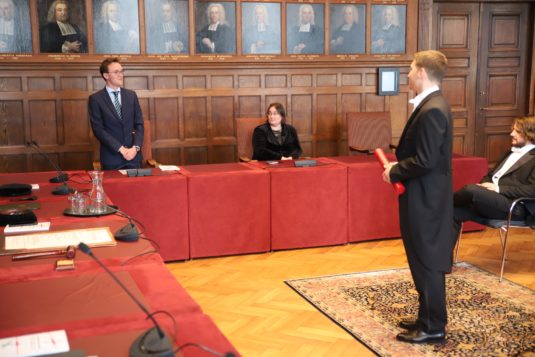Although Freddy Rabouw (UU) is a MCEC tenure track assistant professor and works on various MCEC projects in different roles, this was the first time that he supervised a PhD project from beginning to end. The MCEC Office was curious to know more about his experience!
What did you like about supervising a MCEC project?
Freddy Rabouw: This was the very first PhD project I supervised. It has been exciting to set up a new laser lab from scratch and eventually be able to perform new experiments that nobody in the world has previously been able to do. With the role of a supervisor comes the excitement for new results but also some kind of feeling of guilt when things turn out to be more challenging than anticipated. I could not have wished for a more suitable PhD student than Stijn to make this adventure to a success.
Did it bring back any memories from your time as PhD candidate?
Freddy Rabouw: Many PhD students will get a pretty good feeling of how it is to be a project supervisor. As a PhD student I had supervised multiple MSc and BSc thesis projects. All projects are very similar: the scary feeling of designing research plans for someone else and them adapting them together, the frustration if experiments did not go as initially planned, and the happy feelings in case of success. The only distinction is the duration of the projects.
Stijn Hinterding has now successfully defended his thesis. What were the most difficult challenges to overcome for this project? How did you take on these challenges?
Freddy Rabouw: Obtaining the maximum signal strength and minimizing any background interference is essential for spectro-/microscopy experiments on single molecules and single nanoparticles. I had not expected how much this would depend on the size of a molecule or nanoparticle: smaller objects absorb, in general, less light so they are more difficult to observe over any background signal. We had to gradually improve the microscopy setup that Stijn built, adding more components for precisely focusing our lasers and directing the signal as efficiently as possible to our detectors. We also had to accept that we had to start with relatively easy samples that were strongly absorbing and chemically stable, before studying more challenging materials.
Approaching the end of the project, the Covid-19 lockdown had everyone working from home, labs closed, experiments put on hold. How did you and Stijn cope with this challenge?
Freddy Rabouw: We had a plan for a series of final experiments that were necessary to finish the thesis work, which we had to postpone unfortunately. However, we were able to use our time relatively efficiently, because Stijn was already writing two these chapters with experimental work.
